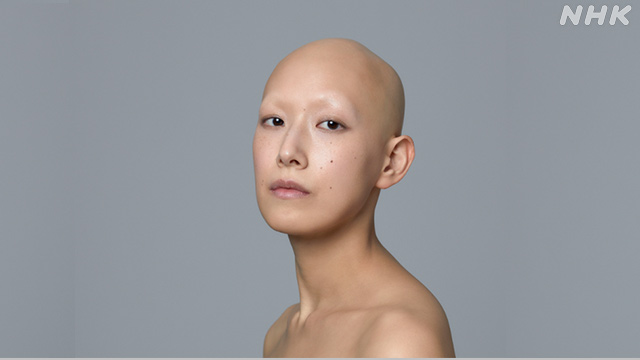Staring straight at us is one of the parties to the "appearance problem".
A photo exhibition modeled after people with visual symptoms such as hair loss due to illness and bruises from birth is being held in Tokyo.
The photo exhibition held in Setagaya Ward, Tokyo, was held together with cosmetics manufacturers by an NPO that works to solve the discrimination and prejudice faced by people with external symptoms as "appearance problems."
The models in the photo were five people with "appearance problems" who have symptoms such as "albino" (albino), which is a light pigment on the body such as skin and hair, and "generalized alopecia", which causes hair to fall out all over the body, in addition to a person who has a red bruise called "simple hemangioma" on the cheek from birth.
What is a "visual problem"?
It is estimated that there are 100 million people nationwide who have these visual symptoms, based on overseas data.
For more than 15 years, NPOs that work to solve problems have been supporting awareness-raising activities and exchanges between people affected by the problem, naming the difficulties they face, such as discrimination in employment and being looked at with curiosity, as "appearance problems."
NPOs are engaged in lectures and other activities to deepen understanding, as people around them do not know about the symptoms or do not have the opportunity to think about them, so they take the wrong action.
We continue to convey that there are problems caused by discrimination and prejudice based on appearance, rather than "problems with appearance."
People who express themselves
The photographs of the five artists exhibited at the venue express their own selves in their works, such as wearing colorful costumes with smiles and posing with their own expressions.
Photography by RiE Amano
Naoyuki
Ishiyama has had a red birthmark with a clear boundary called "simple hemangioma" since birth. Treatment methods include laser treatment and skin grafting, but lasers cannot erase the deep parts of the skin that cannot be reached.
"It was my first time to be photographed, but it was interesting, because when you overcome it, it's fun, so I like to do things that I'm not good at. I don't like being photographed, but I decided to give it a try."
Mariko:
An autoimmune disease called "generalized alopecia" in which hair falls out all over the body.
"When I say 'I don't have hair,' I tend to laugh at people or make fun of me, which makes it difficult to live, so I participated in this event because I hoped that people would change the image of not having hair."
Masaki's
"Treacher-Collins syndrome," in which the cheekbones and jawbones of the face do not form well, may also cause hearing impairment and breathing problems.
I was nervous at first, but everyone was kind so I was able to shoot without being nervous."
Yuka Kambara
has been a "albino" with light body pigments such as skin and hair since birth.
Many people are visually impaired.
"I enjoyed choosing makeup and costumes, and it made me feel better, and even though I didn't know what kind of reaction I would get when the photos came out into the world, I wanted to challenge myself because I didn't know. Cosmetics advertisements for Japan are still mainly for people who are pretty and have good style, but I thought it would be good to see ordinary people who have external diseases or are not models."
Koji Kasuya works as
an albino entertainer.
"I think it will be a positive and gentle message that says, 'Even if people look different from others, they can capture their own personality and live their own lives.'
Many people came to the venue and looked at each photo carefully.
A man
in his 30s: "It gave me an opportunity to think about the 'appearance problem,' and I got the impression that she was simply a fashionable model."
A woman
in her 20s: "I entered the venue thinking that the photos were very beautiful, and I felt that everyone was smiling and shining."
* You can see the video of the venue.
"I want people to feel free."
Hiroko Togawa, president of the NPO "My Face My Style" who organized the event, started the NPO after dating a person who had burns on her face.
Ms. Togawa (center) lined up with the models during the photo shoot
We asked him what he wanted to convey most about this exhibition.
Hiroko Togawa, representative of "My Face My Style",
said, "I don't really want to convey this kind of thing, but I want the viewer to feel free. I'm also very happy that people who didn't know about "appearance problems" look at the photos and say, "That's wonderful." Leaving aside difficult problems, I have a stronger desire to enjoy looking at nice photos."
The photo exhibition is open at "reload" in Setagaya-ku, Tokyo until the 15th of this month.

